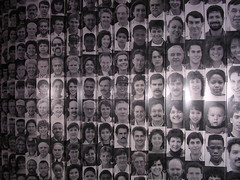I wrote recently a big article on Dutch integration for a Finnish magazine (has not been published yet). When writing the article, I discussed the topic with a number of my friends and colleagues. We shared the confusion. We were all white and lived in nice areas in central Amsterdam. I live in the centre of Chinatown but 90 % of my friends are Caucasian Europeans or Americans. Talk about intercultural competence.
A colleague of mine (non-Dutch) wrote an excellent opinion article recently to the Dutch newspaper NRC Handelsblad about the Dutch citizenship ceremony. The new Dutchmen and -women received t-shirts and cheese with small Dutch flags. She questioned - in my opinion rightly so - if this is really what the society wishes to communicate.
Integration and multiculturalism is one of the most difficult discussion topics I know. It is difficult to say something that would not sound superficial, would not be repeating someone else's thoughts or could help in solving the real problems. And I still have the question of von Trier's Manderlay in my head: how strongly should we impose our values and ways of living on others?
For me one of the best discussions on the subject lately has been one at work where we talked about otherness and sameness. The question was which comes first when you enter a foreign country. I believe that you start from the notion of otherness and difference and then - maybe - later experience some feelings of sameness.
Why do I write about this? Because I found an article that really was an excellent, non-emotional and pragmatic approach on the subject. Those who have been following this weblog are not surprised that the text comes from Britain. One of their leading thinkers on this subject, Lord Bhikhu Parekh, stresses in an article for Prospect (unfortunately not free of charge) the importance of emotional commitment from both sides. This article is definitely worth reading. He states that it is not like the immigrants would be the first signs of difference and heterogeneity in our Western societies. "In principle no more and no less can be demanded of them (immigrants) than of their fellow citizens. To demand more is to place a greater burden on them, to demand less is condescending."
MM16 Suomen tuloerot
1 day ago













No comments:
Post a Comment